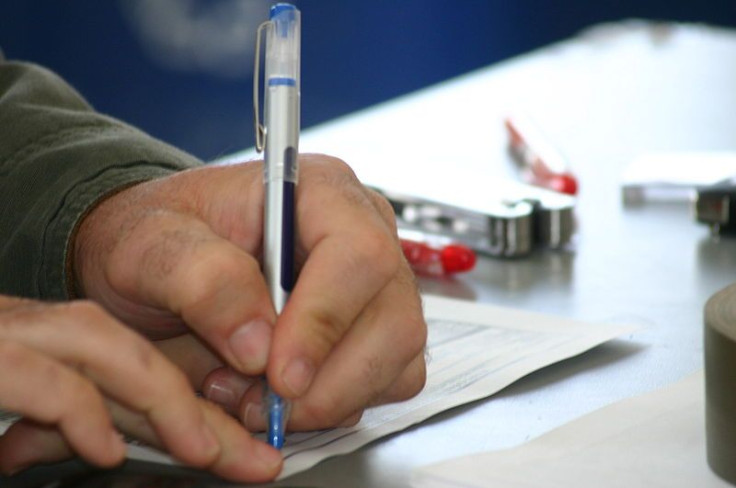High School Students Use Mindfulness To Find Relief From Test Stress

Mindfulness exercises, such as tai chi, meditation, and breathing practices are respected traditions for balancing energy within the body. It's been used as a complement to modern medicine to help people cope with all types of conditions, including cancer and post-traumatic stress disorder. Most recently, a high school just north of Philadelphia has started teaching mindfulness in order to relax students before class, and especially before major exams.
Kate Rosselli, an SAT college entrance exam prep teacher, starts each class at Central Bucks High School West with the students stretching their hands up toward the ceiling. Then she dims the lights, rings a bell, and asks the students to sit with their feet flat, hands resting on their laps, and eyes closed. She instructs them to begin at the bottom, to notice their feet and move upwards, while focusing on breathing. During the two minutes they do this, they take a mental inventory of everything happening within their bodies, according to The Philadelphia Inquirer.
"Breathe in new energy and relaxation," Rosselli says during the sessions. "Breathe out tightness, tension, and fatigue." After the sessions, test prep resumes as normal.
Mindfulness is meant to help students relax themselves from the stress and anxiety that comes with college entrance exams and other tests. It focuses on "paying attention to the present moment on purpose, in a particular way, and without judgment," Todd Cantrell, a house principal at Central Bucks High School West and organizer of the program, told The Inquirer.
In a recent study, mindfulness was shown to reduce anxiety by 39 percent. Researchers recruited 15 volunteers to participate in four 20-minute classes. None of the participants had clinical anxiety disorders, but were experiencing normal levels of anxiety. MRI scans measured their brain activity before and after mindfulness exercises.
Cantrell started the program after he became concerned for two students who looked like they were buckling under pressure. He says that students are "never offstage."
"They are constantly connected. Any moment, somebody can swap a picture and wreck their life. And there's the perception that if you don't go to college, you're a failure, and if you don't go to the best college, you're a failure."
With that mentality, many students endure the pressure of not only the SATs, but also AP courses, while participating in a number of extracurricular activities and applying to college.
"I worry a lot about everything I have to do," Allie Monahan, a student at Central Bucks, said. "Sometimes I get headaches when I'm stressed."
But with short deep-breathing meditation before bed and before tests, Monahan believes the exercises are helping.
"I'm not thinking about everything else going on in my life," she said. "I can think about just the test."
Another teacher, Beth Howard, at Central Bucks South also teaches the exercises in her Living Independently class. She says the differences are noticeable once the students get used to the exercises.
"When the kids get good, you can see a difference," Howard said. "Their body demeanor changes from tight and flustered, to more relaxed. Shoulders are down, jaws loose, and eyes in front instead of on the 15 things in their book bag."
Source: Zeidan F, Martucci KT, Kraft RA, et al. Neural correlates of mindfulness medication-related anxiety relief. Social Cognitive and Affective Neuroscience. 2013.



























